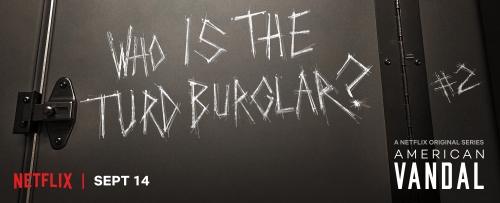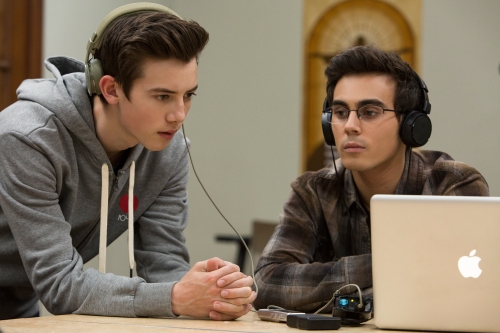
When American Vandal debuted last fall, it was a surprise: the show launched with little fanfare, and read as a sketch concept more than a television series. But if there were any questions about whether a satire of true crime documentaries focused on phallic high school vandalism could sustain a season of television, American Vandal answered them with an affirmative yes. Not only did the series find plenty of humor in the spray-painted dicks and the lead suspect Dylan Maxwell, but it also wove a complex story about the students who were documenting the attempts to exonerate him, eventually landing on some really honestly quite profound observations about both the ethics of true crime investigations and the daily challenge of existing as a high school student in our contemporary moment. That it did so while committing to the verisimilitude of its diegetic social media posts may have been what burrowed it straight into my heart, but the way the series unraveled into a quite meaningful study of adolescence made it one of my favorite shows of last year, and earned it a Peabody Award this Spring.
The idea of a second season came with a new set of questions, however. Although some (wrongly) insist that the first season came to an ambiguous ending, the story of Dylan Maxwell and “Who Drew The Dicks?” ultimately did end, meaning that the show moving forward would need to approach itself as a seasonal anthology series, wherein each season focuses on a different crime. Given that the true crime documentary genre remains incredibly successful, and has various iterations and formats that can be used to fuel further satire, I can see why all parties—Netflix with a successful series with young demos, CBS looking to leverage that success to increase their license fees as the show’s production studio, the producers thinking about ideas and styles they wanted to explore—would be willing to move forward with a second season.

Photo: Scott Patrick Green / Netflix
American Vandal season two taps into the same ideas that made the first season so surprisingly profound, telling another story about the minefield of modern high school existence told through a juvenile (in this case scatological) criminal act, this time at a Catholic high school in Washington. But in its efforts to try to replicate the success of the first season, the producers decided to retain a key piece of continuity: the men behind the camera, Peter Maldonado and Sam Ecklund, who travel to Saint Bernardine High School to produce the second season of American Vandal as their senior project. Given how critical Peter’s choices were in the consequences of the production of the documentary in season one, and how much Peter and Sam’s relationship fueled the later drama in that season, I saw the choice to retain the two filmmakers as an effort to tap into the interconnectivity that made the first season resonate the way it did.
Which is why it was so disappointing when I reached the end of the second season and realized that Peter and Sam might as well have not even been involved.







 Awkward. has been successful with MTV’s key market, drawing significant fan response for its relatable teen characters among young female demographics. It’s a show that fits comfortably into expectations for a show in the age of social media, eminently hashtaggable, and it’s become a key cornerstone in the channel’s original programming efforts.
Awkward. has been successful with MTV’s key market, drawing significant fan response for its relatable teen characters among young female demographics. It’s a show that fits comfortably into expectations for a show in the age of social media, eminently hashtaggable, and it’s become a key cornerstone in the channel’s original programming efforts.






